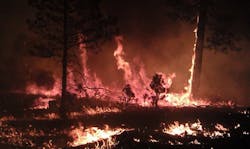New Mexico's Largest Fire Growing in All Directions
Source Silver City Sun-News, N.M.
SILVER CITY, N.M. -- The Whitewater-Baldy Fire, now the largest wildfire in state history, continues to expand in all directions.
The fire, which was measured at 170,272 acres on Wednesday morning, has grown more than 100,000 acres in a week and is still 0 percent contained. According to fire information officers, suppressing the lightning-caused fire has cost $6 million so far -- money that has brought in, as of Wednesday, 1,236 personnel, including 15 hotshot crews and 13 hand crews, as well as 12 helicopters. Five firefighters were injured this week due to fire-related injuries, but according to information officers, they were treated and released. None had to be hospitalized.
Several public officials plan to visit the area, including Gov. Susana Martinez who will travel to Reserve today to survey fire damage and meet with Type 1 Incident Commander Tony Sciacca, fire crews and other personnel who are involved. Also, U.S. Congressmen Steve Pearce is scheduled to arrive in Glenwood this weekend and New Mexico Department of Public Safety Secretary Gorden Eden traveled to Reserve on Wednesday. U.S. Sen. Jeff Bingaman was in Reserve on Tuesday to announce the state's eligibility for federal firefighting assistance from FEMA, which will offset firefighting costs by 75 percent.
Like Tuesday, much of the growth was attributed to dryness and low humidity, which was at 5 percent on Wednesday, according to Gerry Perry, an information officer for the fire. Wind speed, however, which had been lighter since the weekend, picked up Wednesday to between 14 and 24 mph sustained with gusts of up to 24 mph, contributing to some of the expansion, particularly on the east side of the fire.
"It's primarily the humidity, but the wind is certainly causing some of (the growth), said Perry. "And it's terrain-driven winds, which can cause the wind to vary in direction."
The fire's expansion -- primarily in the Gila Wilderness on the east side of the fire, as well as spot fires on the west side -- burned vegetation in drainage areas, Perry said, which, although isn't as important as areas that contain structures, spells trouble for nearby communities when monsoon season arrives in July. When vegetation is destroyed in drainage areas, which funnel water from streams and rainfall into the Gila River, the soil is destabilized, Perry said, meaning the ground can t absorb as much moisture -- which means flooding.
"The resource values that are in those drainage areas are important," he said. "After this fire has passed we'll get the monsoons in here and anticipation of flooding from those monsoons is a big concern."
He added that the Forest Service is creating a burned area emergency response team that will eventually distribute straw and seeds from a resilient type of grass that will counteract the fire damage in drainage areas.
Currently, Perry said, crews are continuing to build fire lines and perform burnout operations that will eliminate flammable material the wildfire would otherwise feed off of.
"We can burn things under our own conditions rather than allowing the approaching fire to dictate the conditions," he said.
Tuesday's burnout and spot fire fighting operations saw some success on Wednesday, Perry said.
Crews assigned to Forest Road 141, which is immediately north of the blaze and was the scene of extreme fire activity on Tuesday, according to fire information officers, managed with the help of air tanks to extinguish spot fires that jumped across the road. Crews also created a secure fire break around Mogollon, which has been under a mandatory evacuation order since last weekend, with the burnout operations that were performed there on Tuesday, according to a release from New Mexico State Forestry. The area around Willow Creek, also under a mandatory evacuation order, is "looking secure," the release said.
"We have structure protection crews actively working those communities," Perry said. "They're doing a lot of structure protection work -- making sure there's a clearing around the structures and wrapping structures with a fire resistant material."
Structure protection in Glenwood, which is about 6 miles west of the fire and was the site of a Forest Service-hosted community meeting on Tuesday evening, isn't happening at this point, Perry said, and no evacuation order is anticipated. Of course, because of the wildfire's dynamic nature, especially considering the fact that no precipitation is expected until July, anything is possible, he said.
"No impending pre-evacuation warnings are anticipated, but that could always change," Perry said. "This fire is far from over."
Copyright 2012 - Silver City Sun-News, N.M.
McClatchy-Tribune News Service






